
On Thursday, US President Donald Trump signed an executive order declassifying documents on the assassination of the 35th US President John F. Kennedy, Senator Robert Kennedy, and civil rights leader Martin Luther King Jr.
“More than 50 years after the assassinations of President John F. Kennedy, Senator Robert F. Kennedy, and Pastor Martin Luther King Jr. the federal government has not made all of its records related to these events public. Their families and the American people deserve transparency and truth,” the text of the decree reads.
The document emphasizes that within the next 15 days, the Director of National Intelligence and the Attorney General must submit to Trump a plan to fully disclose records related to the assassination of President John F. Kennedy, and within 45 days – those related to the assassinations of Senator Robert F. Kennedy and Martin Luther King Jr.
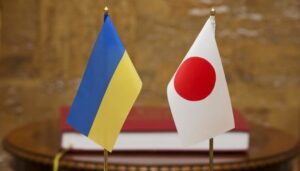
Prime Minister of Ukraine Denys Shmyhal says that Ukraine and Japan have signed 56 intergovernmental agreements, memorandums, and arrangements between businesses and local authorities at the Economic Development and Recovery Conference.
“56 documents were signed by representatives of Ukraine and Japan at the Economic Development and Recovery Conference in Tokyo! Among them are intergovernmental agreements, memoranda, and agreements between businesses and local authorities,” Shmyhal wrote on his Telegram channel.
In particular, an intergovernmental convention on the avoidance of double taxation was signed; more than a dozen agreements to support Ukraine’s recovery with powerful Japanese organizations (JICA, JETRO, the NEXI Export Credit Agency and the Japan Bank for International Cooperation); grant agreements for the implementation of recovery programs, as well as a number of documents between the Ministry of Agrarian Policy of Ukraine and Japanese companies providing Ukraine with various agricultural machinery and equipment; an intergovernmental memorandum on supporting Ukraine’s recovery with the
“Naftogaz agreed on a wind energy project; the Ukrainian gas transportation system operator signed a memorandum on preparations for the modernization of gas compressor stations. According to the Prime Minister, documents were also signed in the fields of energy, telecommunications, infrastructure construction, and ecology.
“Japan has already shown leadership in financial support for Ukraine. Now Japan should become one of the leaders of Ukraine’s recovery and investment in our economy,” Shmyhal summarized.
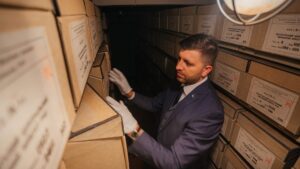
The head of the State Archive Service of Ukraine, Anatoliy Khromov, says that as of today, losses of documents of the National Archive Fund as a result of a full-scale war amount to up to 1.5%.
“Ukraine in 2022 has done much more to preserve its own archives compared to 1941 and to 2014. Obviously, there are huge threats, but now we estimate the loss of documents of the National Archive Fund to be up to 1.5% of the total array of those documents stored until February 24, 2022,” Khromov said at a briefing on Thursday.
In particular, according to him, because of the fire in the archival unit in the Chernihiv office of the Security Service of Ukraine, up to 13 thousand documents were actually lost, first of all those of the repressive bodies of the communist totalitarian regime.
Also, according to him, since the beginning of the full-scale war, damage to the archive premises without loss of documents has been recorded in Kharkiv, Mykolayiv and Kherson regions.
In addition, Khromov said that as a result of the temporary occupation of Kherson the regional archive was seized and looted, he noted that the loss of these documents is not irretrievable. In particular, about half of the files from the Kherson archive were stolen and later taken to Crimea.
In addition, he said, at the moment there is no information about more than 120 archival institutions, which are either under occupation or in frontline zones.
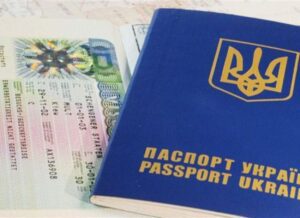
Another stationary service center for citizens of Ukraine Passport Service opens on Friday in Gdansk (Poland), where it will be possible to issue passport documents.
According to the Interior Ministry website, the new center will be located at Gdansk, Aleja Grunwaldzka (Grunwaldzka Alley) 415, 80-309 and will operate from Monday to Saturday from 09:00 to 18:00.
Ukrainians can apply for the following services: simultaneous registration of a passport and an ID-card; issuance of a passport; issuing an ID-card; driver’s license exchange; insurance.
“Acceptance of applications for the issuance of passport documents is possible both by appointment (https://gdansk.pasport.org.ua/solutions/e-queue), and on a first-come, first-served basis. Payment is made directly on the spot, using the online payment for services. Only a smartphone and bank card details are needed for this procedure,” the ministry said.
According to the Interior Ministry, four separate divisions of the state-owned enterprise “Document” have been opened in Poland: in Warsaw, Krakow, Gdansk and Wroclaw. More than 100,000 Ukrainians have already applied for the necessary documents in these centers.
Next year, it is planned to open similar document processing centers in Germany, Spain, the Czech Republic, Slovakia and Turkey.
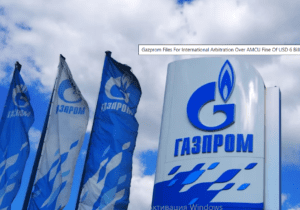
Gazprom, Naftogaz, Gas Transmission System Operator of Ukraine, and the Ukrainian Justice Ministry have signed a package of documents that allow to continue gas transit via Ukraine after December 31, 2019, consistent with the protocol of December 20, Gazprom said in a statement.
“Five days of continuous bilateral negotiations in Vienna have resulted in final decisions and final agreements. Also, the sides have signed a package of agreements and contracts as a big package deal, which restores balance of interests. The documents take effect today to ensure Russian gas transit via Ukraine after December 31, 2019,” Gazprom CEO Alexei Miller told the press.
“Gazprom has done its best and has yet again proven to be a responsible supplier and a reliable partner,” Miller said.
One of the documents signed by Gazprom and Naftogaz is an irrevocable settlement agreement, which stipulates withdrawal of every claim filed by the sides against one another in arbitration tribunals and criminal courts, on which no final judgment has been made as of yet, and prevents the sides from making claims in regard to gas supply and transit contracts of January 19, 2009, in the later period. Earlier, Gazprom paid $2.9 billion to Naftogaz awarded by the arbitration court in Stockholm within the period prescribed by the protocol.
Gazprom and the Ukrainian Justice Ministry concluded an irrevocable amicable agreement, which envisages termination of any current and possible future claims of Ukraine v. Gazprom based on the decision of the Ukrainian Anti-Monopoly Committee.
Gazprom and Naftogaz signed an agreement on organizing gas transit via Ukraine. “Naftogaz hereby undertakes to act as the transit organizer and assumes relevant risks,” Gazprom said.
Naftogaz and Gas Transmission System Operator of Ukraine concluded a transit agreement, while Gazprom and Gas Transmission System Operator of Ukraine signed an inter-operator agreement.
The transit organizer will provide transportation of 225 bcm of gas via the Ukrainian gas transmission system within a five-year period, including 65 bcm of gas in 2020 and annual 40 bcm of gas in 2021-2024.
Necessary compromise
The gas deal between Russia and Ukraine is a compromise which proves that Moscow and Kyiv are capable of reaching an agreement, Russian Prime Minister Dmitry Medvedev wrote on his page on the social network VKontakte.
“The gas contract concluded between Russia and Ukraine for the next five years is a compromise that had to be reached,” Medvedev said.
“The signing of these documents indicates that it is possible to discuss and reach an understanding even on the most difficult issues,” he said.
The Russian government and Gazprom had been working on settling the problem with Ukraine for quite some time, both in the bilateral format and in the trilateral format involving the European Commission, Medvedev said.
“All problems have been solved, and mutual claims have been dropped. Russian gas transit via Ukraine will continue on terms acceptable for all sides,” he said.
5-years signed, 10-year extension possible
A five-year contract for Russian gas transit to Europe via Ukraine has been signed, Ukrainian President Volodymyr Zelensky confirmed.
“This is the end of the year, and we have some achievements. Ukraine has signed a gas transit contract for five years, during which we will earn at least $7 billion. The sides may extend the contract for ten more years,” Zelensky said.
“The Ukrainian gas transmission system will be working, which means energy security and wellbeing of Ukrainians will be provided. At least 65 bcm of gas will be transited during the first year, in addition to 40 bcm of gas per annum within the four subsequent years. In fact, transit amounts can be larger. Europe knows that we will not let it down from the angle of energy security,” Zelensky said.
Ukraine is expecting the gas transit agreement to generate annual revenue of $2-3 billion for the next five years, Energy and Environmental Protection Minister Oleksiy Orzhel said.
The government website quoted Orzhel as saying following the Russian gas transit talks that “one of the conditions set by Ukraine at those negotiations was Gazprom’s payment of $2.9 billion awarded by the arbitration court in Stockholm. We have received these funds. Plus, considering full engagement of the Ukrainian gas transmission system and the fact that new gas delivery routes to Europe will not emerge for a long time, our transit earnings will amount to $2-3 billion annually for the next five years.”
Prime Minister Oleksiy Honcharuk, in turn, underlined the importance of the five-year contract on Russian gas transit to Europe via Ukraine.
“Our team has protected the national interests of Ukraine and has ensured acceptable terms for the gas contract. In signing this document, we were guided by the priorities of Ukraine’s energy security and the wellbeing of our citizens. Thanks to this contract, Ukraine will maintain stability on the domestic and European gas markets. That will have a positive effect on energy markets and serve as a significant factor in reducing gas market prices,” the website quoted Honcharuk as saying.
The Ukrainian gas transmission system will transport 65 bcm of Russian national gas in 2020 and 40 bcm of gas per year for the next four years. The actual amounts may be larger.
Gas transit via Ukraine could come to 75 billion cubic meters in 2020, Andriy Kobolev, the head of Ukraine’s Naftogaz, told a press conference in Kyiv.
He said the forecast was based on 90 bcm transit in 2019 less 15 bcm due to the commissioning of the TurkStream pipeline.
Naftogaz and Gazprom have signed a settlement agreement which stipulates mutual withdrawal of lawsuits, Naftogaz Executive Officer Yuriy Vitrenko said.
“When I was signing the settlement agreement, which stipulates mutual withdrawal of all lawsuits, I felt sorry for the work and knowledge invested by my team in their preparation. […] Still, I realize that our responsibility to the Ukrainians requires that we make decisions to the benefit of the national company instead of our own benefit,” Vitrenko wrote on Facebook.
Continuation of gas transit via Ukraine means thousands of jobs and lower gas fees for Ukrainian households, while the $12.2-billion claim filed with the arbitral tribunal has helped extend the transit contract, he said.
“In other words, we could have won the $12.2-billion claim in the arbitral tribunal only if Gazprom had refused to continue transit. But it did not,” Vitrenko said.
The gas transit deal made between Naftogaz and Gazprom for 2020-2024 is based on the “take or pay” principle, Vitrenko said.
“The fact that we have signed the transit contract based on the ‘pump or pay’ principle is an extraordinary event in this context. I should say this is the first time in the history of Ukraine that Gazprom has concluded a transit contract on the basis of the European ‘pump or pay’ principle. Earlier, Gazprom relied on the ‘take or pay’ principle, which was similar but disadvantageous for Ukraine and lucrative for Russia, only in the area of gas supply,” Vitrenko wrote on Facebook.
Nord Stream sanctions
Naftogaz twice thanked the United States for putting pressure on Moscow and Europe in a press release regarding the conclusion of a package deal with Gazprom.
Gazprom, Naftogaz, and Gas Transmission System Operator of Ukraine signed a package of agreements in Vienna on December 30 to ensure further transit of Russian gas to Europe via Ukraine through 2024.
“This result was backed by a systemic effort of Naftogaz team in preparation of Ukraine to the negotiations as well as the imposition of the U.S. sanctions related to Nord Stream 2 project,” Naftogaz said.
“The package includes the following documents:
1) interconnection agreement between GTSOU and Gazprom establishing technical procedures and rules for cooperation between the operators of the adjacent networks;
2) agreement on organization of transit between Naftogaz and Gazprom setting conditions and transit volumes for the next five years; and
3) settlement agreement between Naftogaz and Gazprom according to which both parties abandon mutual claims under the 2009 contracts,” Naftogaz said.
The three agreements have been signed to fulfill the protocol of the 19-20 December meetings in Berlin and in Minsk, which involved representatives of the EU, Ukraine, Russia, Naftogaz, Gas Transmission System Operator of Ukraine, and Gazprom.
“The protocol included the following provisions:
– USD 2.918 billion compensation paid by Gazprom under the Stockholm Arbitration Awards of December 2017 and February 2018 and received by Naftogaz on 27 December 2019;
– withdrawal from all arbitration proceedings where final decisions have not been rendered yet;
– lifting attachment from Gazprom’s property, assets and monetary funds and refusing from any future claims and proceedings under the contracts signed in January 2009; and
– minimal transit volumes: 65 bcm/year for 2020 and 40 bcm/year for 2021-2024,” Naftogaz said.
“The issue of gas supply was not subject to the package agreements. Naftogaz noted Gazprom’s interest in resuming gas supply to Ukraine in future with the pricing based on the NCG price,” it said.
“The package deal also does not affect Naftogaz Group’s claims against the Russian Federation regarding the assets seized in Crimea,” Naftogaz said.
“The concluded agreements will provide Ukraine with guaranteed revenues from gas transit over the next five years. The certainty of future gas transit creates a necessary environment for continuation of the domestic gas market and broader energy reforms, secures gas transmission jobs and future contracts with Ukrainian industrial producers related to the maintenance of the Ukrainian gas transmission system,” Naftogaz said.
“The agreements that have been signed today are a result of an acceptable compromise. The major outcome of the negotiations is that we have received almost USD 3 billion from Gazprom, and ensured that the Ukrainian system will be able to operate without a loss over the next five years. The transit won’t be interrupted, and will be performed by the independent certified operator. We have demonstrated Ukraine’s reliablility as a transit partner for the EU. Our team is grateful to the European Commission for its consistent position and certifying that the Ukrainian GTS is reliable and efficiently managed. We are also grateful to the U.S. for their firm support of energy security in Europe,” Naftogaz CEO Andriy Kobolyev said.
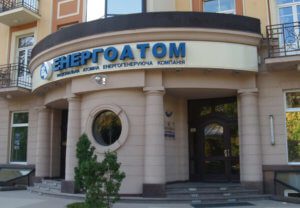
National Nuclear Generating Company Energoatom expects the Cabinet of Ministers of Ukraine soon to approve documents for a tender to attract a partner in the project on the creation of the Ukraine-EU Energy Bridge, Energoatom’s press service has reported, referring to the company’s president, Yuriy Nedashkovsky. “We expect in the near future the approval by the Cabinet of Ministers of the tender documentation, which is needed to hold a tender to determine a private partner for the Ukraine-EU Energy Bridge project. One of the points of the documentation is the procedure for allowing Energoatom to access the interstate electricity market for 20 years, which will ensure unhindered exports of electricity,” the press service quoted Nedashkovsky as saying after a meeting with co-owner of Kulczyk Investments Dominika Kulczyk.
Kulczyk, in turn, assured Energoatom’s leadership that the energy bridge project is a priority for Kulczyk Investments.
Earlier reports, referring to the Ukrainian Energy and Coal Industry Ministry, said that Westinghouse Electric Sweden AB, Polenergia International S.àr.l. and EDF Trading Limited, a consortium of companies, planned to participate in the project to establish the Ukraine-EU Energy Bridge.
The Ukraine-EU Energy Bridge project envisages the organization of transmission from reactor two of Khmelnytsky NPP to the European power grid. The funds that will be received from exports of this electricity will be used to finance construction of reactors three and four of the NPP. The decision to implement a pilot project entitled “Ukraine-EU Energy Bridge” was made by the government in June 2015.
DOCUMENTS, ENERGOATOM, ENERGY BRIDGE PROJECT, TENDER UKRAINE-EU